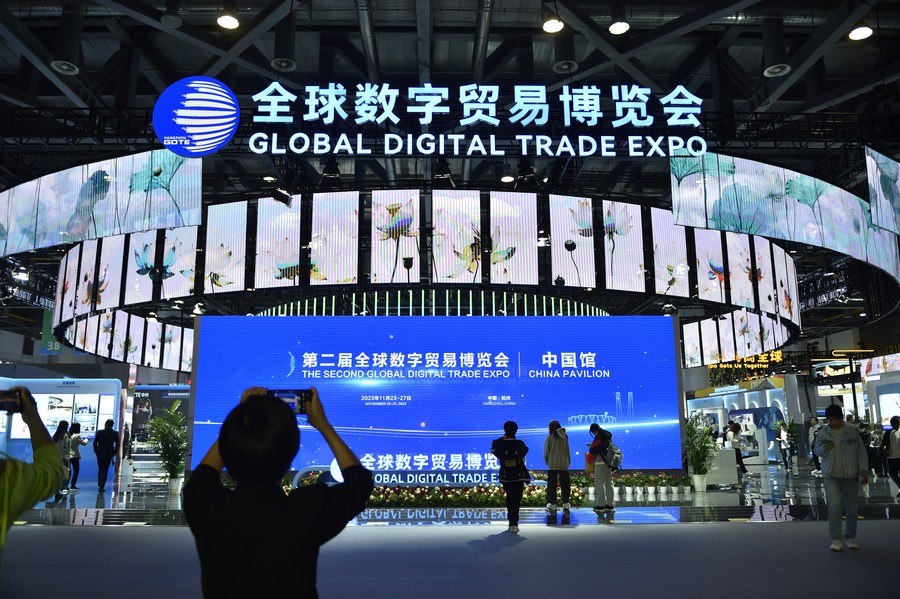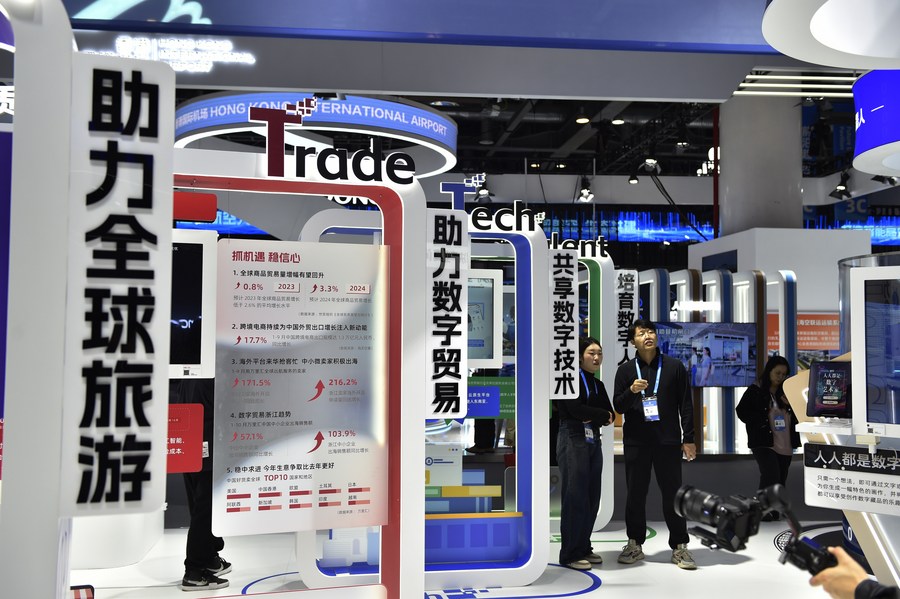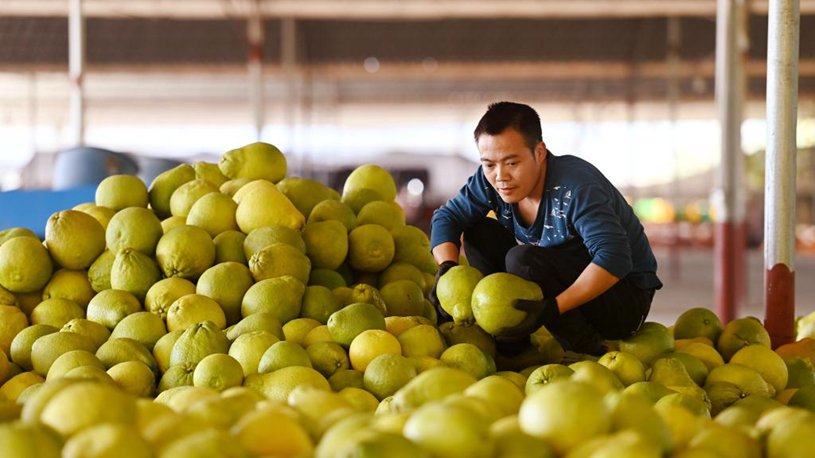*The convenience and efficiency that digital trade brings are proving instrumental in reshaping the landscape of China's foreign trade with global partners.
*Digital foundational services spanning transactions, logistics, payments, production, and manufacturing have provided robust support for the development of digital trade.
*The space for the development of digital trade in China is vast, as the country has a huge scale of digital economy, massive data resources, completed digital infrastructure and abundant scenarios for digital application.
by Xinhua writers Ye Ting, Wang Siyuan, Xia Liang
HANGZHOU, Nov. 24 (Xinhua) -- In just a few minutes, a lifelike digital human figure appeared on the screen, capable of delivering scripted narratives and responding to queries in live broadcasts. This has made uninterrupted 24-hour streaming no longer a daunting task for e-commerce practitioners.
At the second Global Digital Trade Expo (GDTE) that kicked off in Hangzhou, the capital of east China's Zhejiang Province on Thursday, various digital innovations, including the aforementioned 'digital human,' covering digital technologies, services, and content, among others, have captivated visitors with the possibilities they offer.
Not only has the integration of digital technology with various business sectors created numerous products or services for global industry insiders to take advantage of, the convenience and efficiency it brings are also proving instrumental in reshaping the landscape of China's foreign trade with global partners.
The expo, themed "Digital Trade, Global Access," has attracted 68 international organizations and business associations, as well as over 800 enterprises. More than 100 activities are expected to take place at the expo scheduled from Nov. 23 to 27 and over 100 cutting-edge products and services will make their debuts.

This photo taken on Nov. 23, 2023 shows the China Pavilion at the second Global Digital Trade Expo in Hangzhou, east China's Zhejiang Province. (Xinhua/Liu Lingyi)
As an emerging hotspot in the field of artificial intelligence (AI), more than 50 cutting-edge large models from around the world are displayed in the frontier trend pavilion, including those created by Chinese internet giants.
Tencent showcased its WeChat palm pay, which offers users a medium-free, contactless, highly convenient, and secure payment experience in various scenarios, such as retail stores and subway.
The Alimama Wanxiang Lab by Alibaba Group enables hundreds of thousands of merchants to embrace virtual models for their products and efficiently create product images in bulk at zero cost.
Youdao, an intelligent learning firm under NetEase, presented its virtual spoken language coach that can tailor its teaching to individual needs, which is based on China's first large educational model "Zi Yue" with language understanding and interaction capabilities.
The rapid advancement of digital technology reflects Chinese internet giants' resolve to seize opportunities in digital trade, accelerating the proliferation of digital products and services across various domains, such as education, healthcare, urban development and office solutions.
With digital engines, traditional trade models are undergoing significant transformation. From digital technology and product trade to service trade, all present vast prospects and possibilities in global trade.
Digitization will continue to be a powerful engine for global trade, enabling businesses to connect with new consumers worldwide, fostering the development of innovative products and services, and facilitating their global dissemination while reducing trade costs, especially those associated with regulatory compliance, said Mathias Cormann, secretary-general of the Organization for Economic Cooperation and Development (OECD), in a speech at the opening ceremony of GDTE via video.
"Developing digital trade is a highly esteemed mega project for both China and the entire world. Compared to traditional trade, digital trade is faster, more cost-effective, and more open, with an unstoppable momentum in its development," said Ding Lei, CEO of NetEase.
Digital foundational services spanning transactions, logistics, payments, production, and manufacturing have provided robust support for the development of digital trade. The explosive growth of AI technology is poised to bring new opportunities for cross-border e-commerce, said Wen Jia, president of public affairs of Alibaba.
Alibaba's international digital business group has unveiled a cutting-edge AI toolkit called Aidge. It aims to empower small and medium-sized enterprises with AI tools for various business scenarios, allowing them to integrate AI into areas such as consumer insight, marketing design and customer service. The goal is to enable businesses to overcome language and cultural barriers, ultimately enhancing their operational capabilities.

Visitors are seen at the Future Development Pavilion during the second Global Digital Trade Expo in Hangzhou, east China's Zhejiang Province, Nov. 23, 2023. (Xinhua/Liu Lingyi)
As another highlight of this year's GDTE, the Silk Road E-commerce (SREC) Pavilion features the achievements made in advancing economic and trade cooperation among Belt and Road Initiative (BRI) participating countries.
As of October 2023, China had entered into memorandum of understanding on SREC cooperation with 30 countries. Data shows that cross-border e-commerce imports and exports for SREC cooperation constitute over one-third of China's total cross-border e-commerce trade.
In order to meet the growing trade need brought by the SREC cooperation, major enterprises in the industry, such as Pinduoduo, Ant Group and Amazon, have all established platforms to facilitate Chinese enterprises in expanding overseas markets.
Ant Group's WorldFirst online platform offers small and medium-sized enterprises (SMEs) engaged in cross-border trade a comprehensive digital payment settlement and financial service. With just one account, businesses can efficiently receive payments from over 120 global e-commerce platforms in 37 different currencies, facilitating their overseas business operations.
Empowered by digital technology, SMEs worldwide are demonstrating remarkable vitality in global trade. From January to August this year, WorldFirst recorded a 59 percent growth in the sales revenue of Chinese SMEs participating in overseas markets, said Eric Jing, chairman and CEO of Ant Group.
In 2022, China's digitally-delivered service trade value rose 3.4 percent year on year to 372.71 billion U.S. dollars, accounting for around 9 percent of the global total, according to the Report on China's Development of Digital Trade 2022 released at the expo. By the end of 2022, the number of Chinese digital service platform enterprises with an individual market value of over 1 billion U.S. dollars had exceeded 200.
Likewise, an increasing number of overseas brands have entered the Chinese market or expanded their business with the rise of digital trade in China.
Since 2019, Qianxun Group, a multi-channel network, has facilitated transactions with its live-streaming platforms for various products from 12 BRI countries. More than 29 million items were sold, with the transaction volume totaling over 5.5 billion yuan (about 769.6 million U.S. dollars).

This photo taken on Nov. 23, 2023 shows the "E-commerce" Pavilion at the second Global Digital Trade Expo in Hangzhou, east China's Zhejiang Province. (Xinhua/Xu Yu)
Cross-border e-commerce has undoubtedly injected impetus into China's foreign trade. From January to September, the import and export scale of the cross-border e-commerce totaled 1.7 trillion yuan, expanding 14.4 percent year on year and accounting for 5.5 percent of the trade volume in goods in the same period.
The space for the development of digital trade in China is vast, as the country has a huge scale of digital economy, massive data resources, completed digital infrastructure and abundant scenarios for digital application, said Wang Yiming, vice chairman of China Center for International Economic Exchanges.
The GDTE digital trade alliance, composed of enterprises, international organizations and business associations in the industry, was established during the expo, with an eye on building a platform to exchange ideas and promote cooperation.
Also, a digital trade think tank co-built by the commercial bureau of Hangzhou and Center for China and Globalization was launched, providing services in various areas such as policy research, investment promotion, talents introduction, and brand activities.
The GDTE is an important platform to propel digital trade, a public good to promote global digital economic cooperation, and a significant measure to build an open world economy, said Vice Commerce Minister Wang Shouwen.
China will continue to promote the development of digital trade, he said, adding that efforts will be made to strengthen top-level design, improve the construction of relevant platforms, develop new business forms, and promote higher-level opening up, sharing opportunities brought by digital trade with other countries. ■
(Video reporters: Song Lifeng, Xu Zhongzhe, Xia Liang; Video editors: Zhang Yueyuan, Li Qin, Liu Yutian, Jia Xiaotong)












